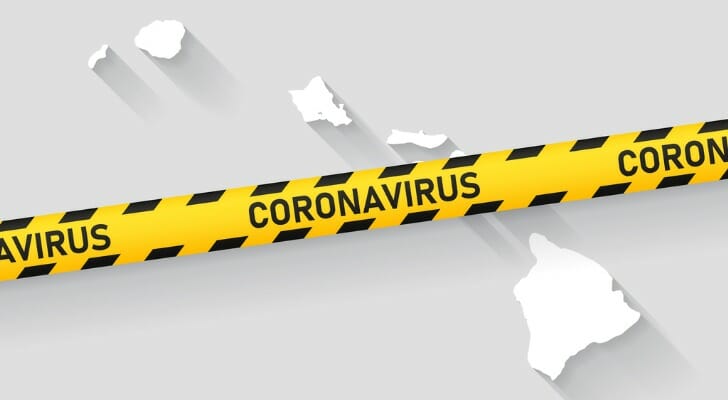In comparison to the rest of the U.S., the state of Hawaii hasn’t been hit particularly hard by the coronavirus pandemic. In fact, by mid-May 2020 there were 638 confirmed cases of COVIDF-19 and 17 fatalities. However, the state is feeling the effects of the pandemic in other ways. There has been a statewide stay-at-home order in place since March 25, and all non-essential businesses have been forced to temporarily close. Hawaii residents affected by the pandemic can avail themselves of numerous federal programs. If you or your business have been adversely affected by the COVID-19 pandemic, consider speaking with a financial advisor who can help address your concerns.
Hawaii Coronavirus Relief for Individuals
Hawaii has a number of online resources available to help families and individuals figure out the best way to handle the financial impacts of the coronavirus pandemic. Whether you’re interested in how to stay healthy and avoid contracting the virus, or you’re trying to figure out how to navigate the complicated financial landscape, there are resources available on the state website.
The Department of Hawaiian Home Lands launched a rental relief program for individuals hurt by the pandemic. The department’s COVID-19 Emergency Rental Assistance Program rental assistance will provide $7 million in Native Hawaiian Housing Block Grant funds to eligible beneficiaries.
Hawaii Coronavirus Relief for Small Businesses
In April, the Hawaii Board of Agriculture approved an emergency loan program for qualified farmers economically hit by the COVID-19 pandemic. The interest rate was 3% and the maximum permitted loan amount was $150,000. Applications can be accepted until Dec. 31. For those needing loans of $25,000 or less, agribusinesses may apply for micro-loans which involve less paperwork and swifter processing.
In May, the state Department of Agriculture said it will distribute $200,000 in grants to 96 farmers in a second round of emergency assistance that followed 106 grants totaling $270,000 in April. The new grants range from $2,000 to $4,000 and are aimed at helping farmers who can’t sell products because of restaurant, school and other business closures.
If you’re a small business looking for online resources to help you figure out how to best prepare for and manage the economic downturn associated with COVID-19, there are resources available on the state government’s website.
Federal Coronavirus Relief for Individuals

The federal government has implemented a number of individual coronavirus relief programs through a $2 trillion bill called the Coronavirus Aid, Relief, and Economic Security (CARES) Act. This law provides individuals with up to $1,200 as a one-time stimulus check payment. The amount you’re eligible to receive decreases by $5 for every $100 above the adjusted gross income (AGI) limit of $75,000. Those who earn more than $99,000 in AGI won’t be eligible to receive anything. Families can get an extra $500 per child under the age of 17.
The CARES Act also provides individuals with enhanced unemployment benefits, allowing most individuals to claim up to 39 weeks of unemployment and receive an extra $600 in weekly benefits until July 31, 2020. The government is also providing individuals and families with rent and mortgage payment relief, student loan relief and an extension for the federal income tax deadline all the way to July 15, 2020.
Federal Coronavirus Relief for Small Businesses
Since the coronavirus pandemic began, small businesses have been a particularly important area of focus for the federal government. Again, through the CARES Act, a plethora of programs are available for them to take advantage of. The Paycheck Protection Program (PPP) is perhaps the most important program among these, as it provides small businesses with partially forgivable loans, provided that funds are used to cover payroll expenses instead of laying off employees. Companies can receive up to $10 million to cover 2.5 times their average monthly payroll, with the exception of salaries above $100,000.
Affected small businesses also have access to Economic Injury Disaster Loan (EIDL) program, which offers loans of up to $2 million per business. This money is meant to be used to cover operational expenses, as many businesses have seen a hefty decline in revenue. Applying companies are also automatically eligible to receive an EIDL grant, which is a $10,000 advance payment that’s paid out while their loan application is being processed. The SBA Debt Relief Program, the 7(a) Loan Program, the Community Advantage Loan Program, the Express Bridge Loan Pilot Program, microloans and 504 loans are all other options for businesses looking for help.
Bottom Line

Businesses, families and individuals in Hawaii are hurting as a result of the coronavirus pandemic. While the state hasn’t yet instituted any relief programs designed to help Hawaiians manage during these times, there are plenty of state-sponsored online resources that they can turn to for help. For specific relief efforts, look towards the federal government’s wide array of relief programs and provisions for both individuals and small businesses.
Tips for Individuals During the Coronavirus Pandemic
- Consider working with a financial advisor to make sure the economic fallout of the pandemic has not derailed your long-term financial plans. Finding the right financial advisor that fits your needs doesn’t have to be hard. SmartAsset’s free tool matches you with financial advisors in your area in five minutes. Get started now.
- If you’re struggling to keep up with loan or credit card payments, there are steps you can take to protect your credit score. You can also speak directly with your bank to see if they’re deferring loan payments or waiving certain fees.
Photo credit: ©iStock.com/bgblue, ©iStock.com/paulacobleigh, ©iStock.com/Don White
